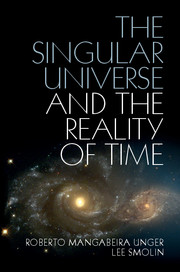Book contents
- Frontmatter
- Contents
- The nature and scope of this work
- Part I Roberto Mangabeira Unger
- Part II Lee Smolin
- 1 Cosmology in crisis
- 2 Principles for a cosmological theory
- 3 The setting: the puzzles of contemporary cosmology
- 4 Hypotheses for a new cosmology
- 5 Mathematics
- 6 Approaches to solving the meta-law dilemma
- 7 Implications of temporal naturalism for the philosophy of mind
- 8 An agenda for science
- 9 Concluding remarks
- Acknowledgments
- References
- A note concerning disagreements between our views
- Index
2 - Principles for a cosmological theory
Published online by Cambridge University Press: 05 December 2014
- Frontmatter
- Contents
- The nature and scope of this work
- Part I Roberto Mangabeira Unger
- Part II Lee Smolin
- 1 Cosmology in crisis
- 2 Principles for a cosmological theory
- 3 The setting: the puzzles of contemporary cosmology
- 4 Hypotheses for a new cosmology
- 5 Mathematics
- 6 Approaches to solving the meta-law dilemma
- 7 Implications of temporal naturalism for the philosophy of mind
- 8 An agenda for science
- 9 Concluding remarks
- Acknowledgments
- References
- A note concerning disagreements between our views
- Index
Summary
The idea that an acceptable cosmological theory needs to be formulated in a framework different from that of the so far successful theories of physics is not new. There is a tradition of critique of Newtonian physics, which leads to what is often called the relational position on the nature of space and time. Relationalism is associated with Leibniz [15], Mach [16],and Einstein [17] and, in the present period, Barbour [18], Rovelli [19], and others. Much of the critique concerns issues that only arise if you aspire to a theory of the whole universe rather than a part of it. General relativity is partly – but only partly, as I will explain – a response to that critique.
The roots of relationalism
We can draw criteria for a truly cosmological theory from that tradition of critique. The starting point is Leibniz’s great principle:
The principle of sufficient reason (PSR). For our purposes we state it thus: for every question of the form Why does the universe have property X? there must be a rational explanation. This implies that there should be rational explanations for the selection of the effective laws we see acting in our universe, as well as for any choices of initial conditions needed for that universe. This application of the PSR was echoed in Peirce’s insistence that “nothing is in so need of explanation as a law” [14].
My view is that we should take the PSR as an aspiration and a goal, perhaps never to be completely reached but, nonetheless, a beacon illuminating the direction in which we are to search for the answer to cosmological questions. We can state this as follows:
The principle of differential sufficient reason (PDSR). Given a choice between two competing theories or research programs, the one which decreases the number of questions of the form Why doesthe universe have property X? for which we cannot give a rational explanation is more likely to be the basis for continued progress of our fundamental understanding of nature.
In this form the PDSR is best used as a means to evaluate progress (has sufficient reason increased?) or to judge the likelihood of success of competing research programs. It is especially useful in judging the promise of novel research programs.
- Type
- Chapter
- Information
- The Singular Universe and the Reality of TimeA Proposal in Natural Philosophy, pp. 367 - 392Publisher: Cambridge University PressPrint publication year: 2014



